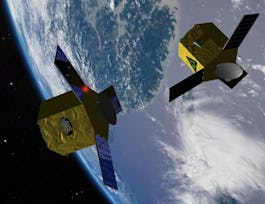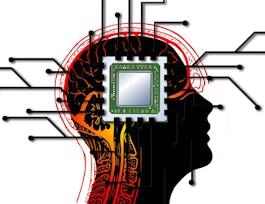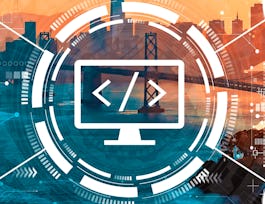Modern rocket design started amidst World War II, pushing the boundaries of what rocketry was capable of. In The History of Rocket Science, you’ll gain a deeper understanding of this complicated history and discuss key advancements, like the creation of the V2 rocket. Examine the ramifications of the advancements of rocket science from a historical and societal perspective, going beyond the technological advancements during the war. This course also explores the Cold War, culminating in the United States’ creation of the Apollo 11 — the pivotal creation that landed the U.S. on the moon. Round out the course by getting a first-hand look at space shuttles, space stations, space tourism, and how companies are opening up space exploration.



The History of Rocket Science
This course is part of Rocket Science 101 Specialization

Instructor: Aaron Ridley
Sponsored by MAHE Manipal
(14 reviews)
Recommended experience
What you'll learn
Describe the progression and the reasoning behind the US's Mercury, Gemini, and Apollo programs
Describe the costs and benefits of the space shuttle program, and why the US lost two shuttles
Describe how Germany developed rockets for warfare in WWII and how the US and USSR used this technology to develop their rocket programs
Details to know

Add to your LinkedIn profile
16 assignments
See how employees at top companies are mastering in-demand skills

Build your subject-matter expertise
- Learn new concepts from industry experts
- Gain a foundational understanding of a subject or tool
- Develop job-relevant skills with hands-on projects
- Earn a shareable career certificate


Earn a career certificate
Add this credential to your LinkedIn profile, resume, or CV
Share it on social media and in your performance review

There are 4 modules in this course
Welcome to the History of Rocket Science course and to Week 1: The Advent of Modern Rockets. This module will take you on a journey through the fascinating history of rocketry, beginning with the time before modern rockets existed and leading up to the post-WWII era. By the end of this module, you will be able to recognize what came before modern rockets, comprehend the cost of rocketry in WWII, and comprehend the development of rocket inventions in WWII in Germany. You will also be able to recognize how the US and USSR responded to post-WWII, setting a strong foundation for the rest of the course. Let's dive into the fascinating world of rocket science!
What's included
4 videos7 readings3 assignments2 discussion prompts
Welcome to the second module of the History of Rocket Science course—Week 2: The Space Race. This module will take you on a thrilling journey through one of the most exciting periods in the history of rocketry—the space race. By the end of this module, you will be able to comprehend the political paradigm of the space race: communism vs. capitalism, recognize the USSR's early victories in the space race, identify the components of the US plan to get to the moon, and explain why the USSR plan failed to get to the moon. Join us as we relive the excitement and intrigue of the space race and gain a deeper understanding of the history of rocket science.
What's included
8 videos6 readings5 assignments
Welcome to the third module of the History of Rocket Science course—Week 3: The Space Shuttle Era. This module will explore the era of the Space Shuttle program, which marked a new phase in the history of space exploration. We will examine the evolution of the shuttle program and its impact on the exploration and utilization of space. The module will be divided into three parts, each focusing on a distinct aspect of the Space Shuttle era. The first part will cover Fast Airplanes, where we will explore the technological advancements that made high-speed aircraft and commercial space travel possible. The second part will focus on Space Stations, where we will examine the construction and operation of the International Space Station (ISS), which continues to be a vital platform for scientific research and technological development in space. Lastly, the third part will cover The Space Shuttle, where we will take a closer look at the cost and benefits of the shuttle program, including its role in deploying and repairing satellites, and its use in servicing the Hubble Space Telescope. Join us as we explore the exciting and innovative era of the Space Shuttle program and gain a deeper understanding of the history of rocket science.
What's included
4 videos4 readings4 assignments1 discussion prompt
Welcome to the fourth and the last module of the History of Rocket Science course—Week 4: The Industrial Revolution. In this module, we will explore how the rocket industry has been transformed by the rise of commercial space companies and the emergence of new space technologies. By the end of this module, you will be able to identify the reasons for the development of small satellites, recognize the cost model of launch vehicles, identify what launch vehicle providers are doing to drive costs down, and comprehend the motivation to go to Mars and how we can get there. Join us as we explore the cutting-edge technologies and revolutionary ideas that are driving the Industrial Revolution in rocket science, and gain a deeper understanding of the future of space exploration.
What's included
5 videos5 readings4 assignments1 discussion prompt
Instructor

Offered by
Why people choose Coursera for their career




Learner reviews
14 reviews
- 5 stars
85.71%
- 4 stars
14.28%
- 3 stars
0%
- 2 stars
0%
- 1 star
0%
Showing 3 of 14
Reviewed on Jun 24, 2024
Thank you, Dr. Aaron Ridley, for the incredibly well presented history of rocket science and space exploration. I enjoyed every single second of the course!
Recommended if you're interested in Physical Science and Engineering

University of Colorado Boulder

University of Arizona

University of Colorado Boulder

EIT Digital

Open new doors with Coursera Plus
Unlimited access to 10,000+ world-class courses, hands-on projects, and job-ready certificate programs - all included in your subscription
Advance your career with an online degree
Earn a degree from world-class universities - 100% online
Join over 3,400 global companies that choose Coursera for Business
Upskill your employees to excel in the digital economy


